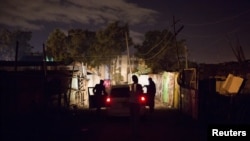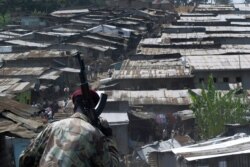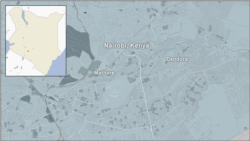Police in Kenya have often been accused of using excessive and unlawful force while in the line of duty. A new report published Wednesday by Human Rights Watch finds that police were involved in the killings of at least 21 people since August 2018, in just two of Kenya's informal settlements.
On the evening of April 28, 2017, Isaac Kamau Mwangi left his mother's house in Nairobi's Kayole Estate to pick up his car at a car wash.
His sister Ruth Mumbi says those were his final hours.
"He was on his knees pleading with people who wanted to kill him," Mumbi said, recounting what a witness had told the family. "The only thing that the boda boda driver heard was the shot and my brother screaming loud, calling out my name. I came to know the following day that he was killed by officers."
Colleagues remembered Kamau as a devoted taxi driver; his family remembers him as a loving father of two. To police, however, he was a wanted highway robber.
100s of documented cases
Kamau's death is one of hundreds of cases of extrajudicial police killings documented by rights groups in Kenya.
In its new report, Human Rights Watch accuses police of killing at least 21 suspects since August 2018 in Dandora and Mathare, two of Nairobi's slums.
HRW researcher Otsieno Namwaya says the killings bore similarities.
"The common trend was that either the police brand somebody a thief and either warn the person or put their name on social media, and then a week or two later the person is found dead, or they ambush the person somewhere either in the house or on the street, arrest the person, or ask the person to kneel down and then shoot the person in broad daylight and sometimes in the full glare of the public," Namwaya said.
The report says the Independent Policing Oversight Authority (IPOA), Kenya's police accountability institution, has not done enough to stop police from killing people.
Since inception of the oversight body in 2011, there have been six convictions of police officers accused of extrajudicial killings.
Anne Makori, the IPOA chairperson, says the organization has investigated more than 5,500 cases and sent more than 1,900 others to the public prosecutor's office, the ODPP.
"Because we have investigative powers, [when] we find the officer is culpable, we forward that file to the ODPP for prosecution, because we do not have prosecutorial powers," Makori said. "As we speak, we have 164 files within ODPP and we have 49 files within the court system."
Witnesses scarce
Mumbi says that in most cases, families like hers never find justice, as witnesses are usually afraid to come forward.
"For this case, the person who came to report to us, who saw what Kamau had gone through, was also afraid," she said. "In fact, he changed his number, and he doesn't even live in Nairobi."
In the HRW report, Kenya's police spokesman is quoted as saying, "Any officer who breaches the law must face the consequences as an individual." He said the IPOA ought to investigate the killings in Dandora and Mathare, and "ensure the culprits are prosecuted."






